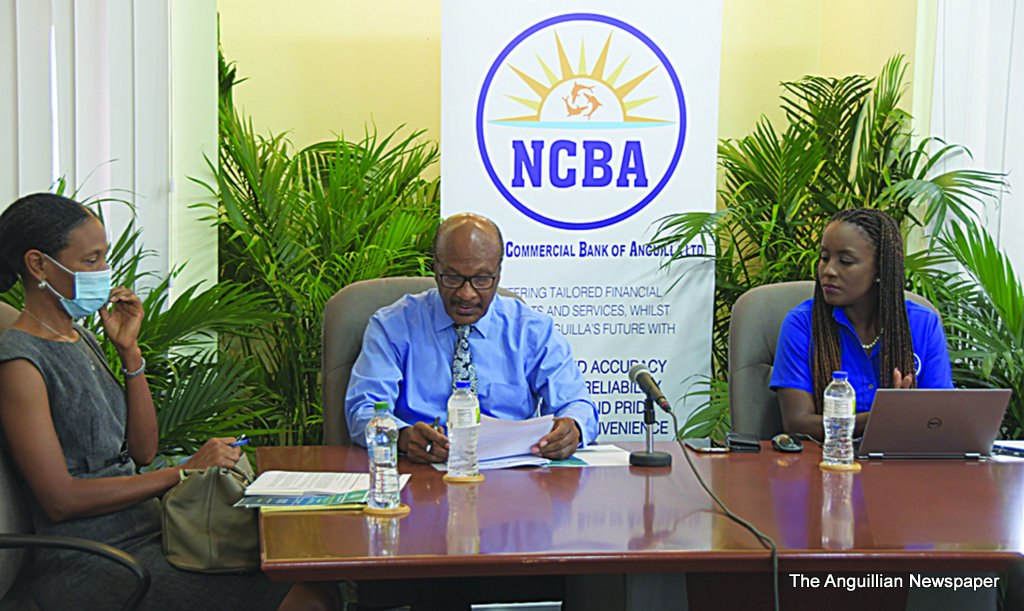Friday, July 30th, marked the fifth anniversary of the National Commercial Bank of Anguilla (NCBA). That day, under the theme “Moving Forward Together”, the Bank held a press conference at its Head Office on St. Mary’s Street in The Valley. There, the Bank’s CEO, Ms. Sharmaine Francois, made the announcement that the financial institute had been removed from bridge bank status. It is now a fully commercial bank.
Pursuant to Section 185 of the Banking Act of Anguilla — on April 16th, 2021, the Eastern Caribbean Central Bank approved the bank’s application for removal from its bridge bank status. Since April 25th 2016, NCBA was established as a bridge bank following the transfer of assets, liabilities and operations of the two failed indigenous banks — National Bank of Anguilla Ltd. and Caribbean Commercial Bank (Anguilla) Ltd. The bridge bank operation was established for a period of five years which expired on April 21st, 2021.
During the July 30th press conference, Ms. Francois made a walkthrough of the Bank’s consolidated financial statements for three years: 2017, 2018 and 2019. These statements pertained not only the Bank as a standalone entity, but they showed data relative to the bank’s operations combined with its subsidiaries, NCDS and MAICO.
The impressive information presented by Ms. Francois indicated the sound financial standing of NCBA, and showed the merits upon which the institution could capably graduate to a full-service financial entity. Ms. Francois stated that the financial statements, which included the Bank’s Balance Sheet, Income Statement and Statement of Cash Flow, were complete with the auditors’ reports for each of the three years.
“The Auditors have issued an unqualified opinion on the Bank’s financial statements,” the CEO said. An unqualified opinion means that the auditors have made an independent judgment in surmising that the bank’s financial statements are fair and adequate and are in compliance with generally accepted accounting principles.
Ms. Francois explained that from 2017 to 2019, key Balance Sheet highlights showed that the Bank’s cash position had improved significantly. In 2017, Cash and Cash Equivalents stood at EC$126 million whereas in 2019 this account rose to EC$209 million, an increase of 66%.
The Investments account had also increased remarkably. In 2017, investments stood at EC$42 million, but in 2019 they rose astronomically to EC$144 million which is a favourable increase of 247%.
As far as Loans and Advances are concerned, the CEO said that over the three-year period there had been a decline. This means that the Bank had curtailed lending between 2017 and 2019. In 2017, the actual Loans and Advances portfolio amounted to EC$404 million but in 2019 this figure dropped to EC$341 million, a reduction of some 16%.
With regard to this, Ms. Francois explained: “A lot of this reduction was related to the setup of the bank as a bridge bank. But by 2020, one will see this pattern reversing. Now we are on a growth path where the portfolio of loans is growing as we move forward.”
“There has been a 15% increase in Customer Deposits,” Ms. Francois noted. “Deposits from our customer base moved from EC$645 million in 2017 to EC$742 million in 2019.”
In terms of overall Total Assets, Ms. Francois indicated that there had been a noteworthy increase. For 2017, Total Assets were EC$657, whereas in 2019, the overall assets figure had risen to EC$801 million. This represents a 22% improvement.
As far as the bank’s capital is concerned, Ms. Francois stressed: “One thing to note is that the capital adequacy of the Bank has remained intact. Our benchmark, which we must maintain, is an 8% capital adequacy ratio in terms of total capital. And, indeed, we closed 2019 at 8%. When we look at where we came from we see that in 2017 we had a capital ratio of only 0.24% — but with the new injection of capital our capital ratio position was ideally improved.”
“The Income Statement showed stronger indicators,” Ms. Francois mentioned. “Over the period 2017 to 2019 we have seen a stronger Net Interest Margin. The Bank’s interest margin has, in fact, improved. We closed 2017 at a 65% margin and that has increased with the income that we earned on loans and investments to 69% in 2019.”
The Net Operating Income Margin for the three years also showed a consistent strengthening. From a close at -19% in 2017, the margin improved to -12% in 2018. And by the end of 2019, the Net Operating Income Margin showed strengthening to a positive 40%. In 2017 the Net Income or Loss account showed that the operations suffered a loss of EC$-11 million; in 2018 there was a milder loss of EC$-5 million; but by the end of 2019 a definite turn around resulted in a positive income of EC$8 million.
Ms. Francois explained the effects of the Bank’s consolidated position with its subsidiary companies, NCDS and MAICO: “With reference to the consolidated accounts,” she said, “we factored in the gains we realised from the purchase of our two subsidiary entities. This gave us a total consolidated gain of EC$8.8 million when we brought in NCDS and MAICO as part of the NCBA Group. All in all, we have moved from uncertainty to a more stable position now.
“Our strong Balance Sheet growth speaks to the confidence that the public has placed in the Bank. Over the three years, the Balance Sheet of the Bank has grown to EC$133 million, and we have strong customer confidence. Due to the confidence that the residents of Anguilla and the Diaspora have placed in the Bank, we have grown new deposits of EC$97 million over the three-year period.”
After presenting more favourable financial data pertinent to the success of the Bank’s operations, over the three-year period, the CEO claimed: “Due to our market share, NCBA remains the leading bank in all key areas. For the financial year of 2019, based on the total loans for Anguilla as a country, NCBA holds 63% of market share. So, the survival of Anguilla’s financial sector heavily relies on NCBA.”
“NCBA is no longer a bridge bank,” the CEO asserted, “and we were not required to sell the Bank in order to be removed from its bridged position…Our bridge bank status expired on April 21st. The Central Bank gave the approval for the removal of the bridge bank status on April 16th 2021. NCBA is now a full-service commercial bank. We are pleased to make this announcement. This is a huge accomplishment for NCBA.”
“The removal of the bridge bank status,” Ms. Francois noted, “was driven by key achievements. We had to strengthen the Bank’s capital. We had to strengthen our liquidity. We had to improve our financial position. And from looking at the financial statements, we can see that all of these were achieved. Besides, we had to show strong corporate governance, stable performance, safe ratios, reduction strategies, strategic initiatives and the divesting of shares…All of these necessary requirements were met.”
In other NCBA news, On July 21st 2021, the Government of Anguilla, as the sole shareholder of the Bank, retired its three existing local Directors from the Board of NCBA: Mr. Carl Harrigan, Chairman of the Board; Mr. Stanley Reid, Director and Mrs. Vida Lloyd Richardson, Director.
In addition, two new Directors were appointed to the Board, namely: Ms. Marisa Harding-Hodge, and Mrs. Elvarie Vanterpool. The NCBA Board will operate in the short term with six Directors. The addition of a third local Director is underway and will be communicated subsequently.
A new Chairman was appointed from the four overseas Directors to ensure the smooth transition of knowledge and leadership of the Board of NCBA. Mr. Geoffrey Scott, an overseas independent Director, was appointed as the new Chairman of NCBA.










